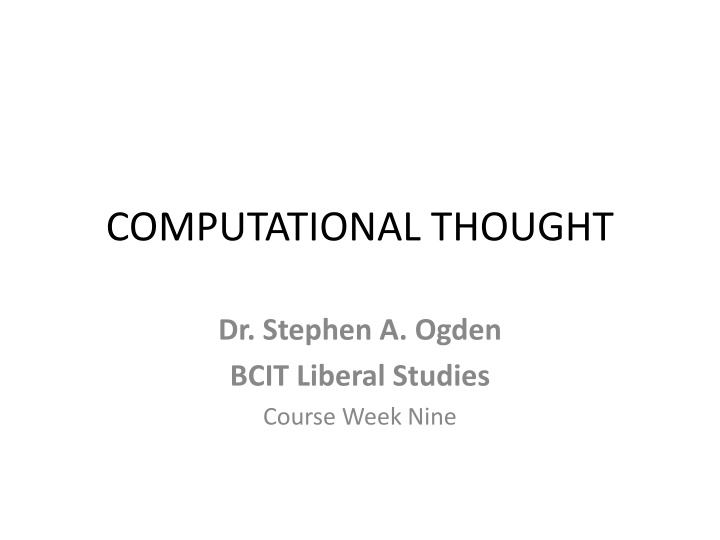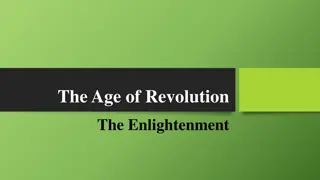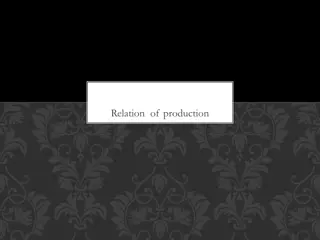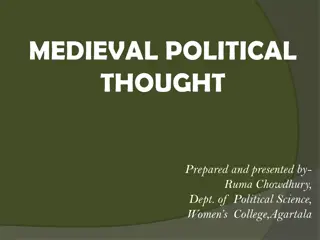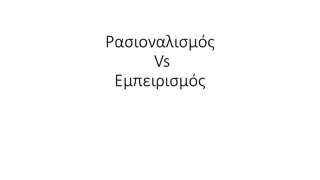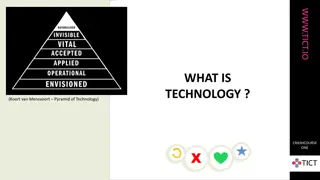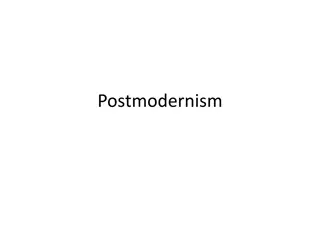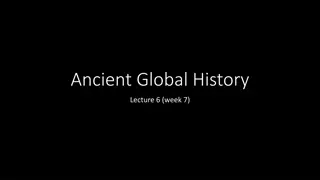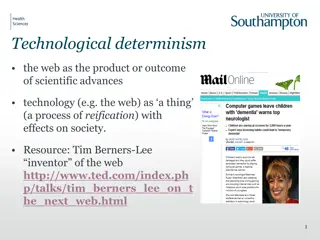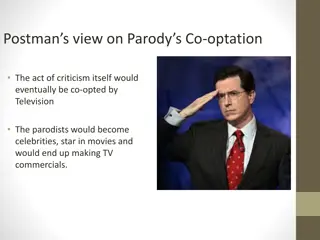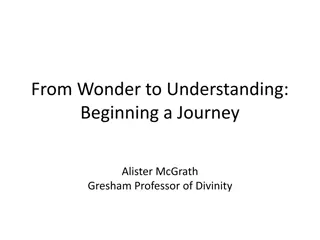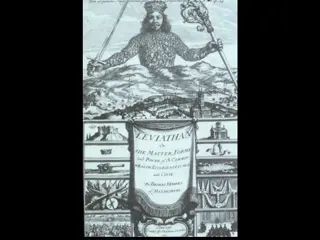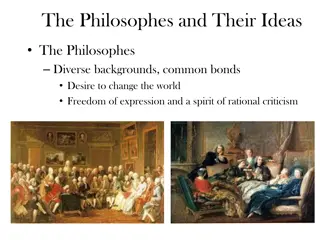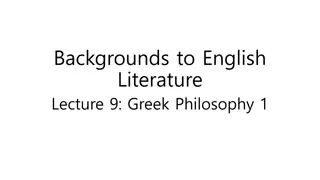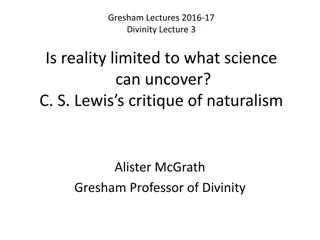Reflections on Technology and Society: Insights from Various Thinkers
Explore the complex relationship between technology and society through the perspectives of different philosophers and theorists like Marshall McLuhan, Thomas More, Socrates, and Homer. From the concept of technology as an extension of man to the warnings about the potential threats of certain technological advancements, delve into thought-provoking ideas that challenge our understanding of the impact of technology on humanity.
Download Presentation

Please find below an Image/Link to download the presentation.
The content on the website is provided AS IS for your information and personal use only. It may not be sold, licensed, or shared on other websites without obtaining consent from the author.If you encounter any issues during the download, it is possible that the publisher has removed the file from their server.
You are allowed to download the files provided on this website for personal or commercial use, subject to the condition that they are used lawfully. All files are the property of their respective owners.
The content on the website is provided AS IS for your information and personal use only. It may not be sold, licensed, or shared on other websites without obtaining consent from the author.
E N D
Presentation Transcript
COMPUTATIONAL THOUGHT Dr. Stephen A. Ogden BCIT Liberal Studies Course Week Nine
A.I. IS JUST TECHNOLOGY (i.e. the cost-benefit ratio is a constant) MARSHALL MCLUHAN Canadian technology theorist (b. 1911) 1. Technology is an extension of Man.* 2. Each extension is an amputation of Man 3. Each amputation of Man creates alienation (* extension = amplification ) (**technology is a medium: how man mediates with his environment) the medium is the message **
Dystopia From Utopia, Thomas More, 1516: lit. no-place (an invented ideal country). DYSTOPIA: lit. broken place e.g. A Clockwork Orange Cf. CACATOPOIA: lit. evil place E.g. 1984 EUTOPIA: lit. good place New Jerusalem in the Book of Revelation
Socrates: (4thC. BC) Wisdom The Phaedrus The Soul (Nous) controls both (a.) Moral Impulse and (b.) Appetite
Socrates: The Threat of Technology The Egyptian city of Naucratis had an old god called Theuth; he was the inventor of many arts, such as arithmetic and calculation and geometry and astronomy and draughts and dice, but his great discovery was the technology of writing. In those days, another god called Thamus ruled Egypt. Theuth came to Thamus and showed his inventions, desiring that the other Egyptians might be allowed to have the benefit of them; he enumerated them, and Thamus enquired about their several uses. When they came to the invention of writing, Theuth said that it will make the Egyptians wiser and give them improved memories; it is a targeted technology improving both memory and intelligence. Thamus replied: O most ingenious Theuth, 1. The inventor is not always the best judge of the utility or inutility of his own inventions to the users of them. 2. And in this instance, you who are the inventor of the technology of writing attribute to them a quality which they cannot have; for this discovery of yours will create forgetfulness in the learners' souls, because they will not use their memories; they will trust to the external written characters and not remember of themselves. 3. Users of your technology will not learn truth, but only the appearance of truth; 4. They will be hearers of many things and will have learned nothing. 5. They will appear to be omniscient and will generally know nothing 6. They will have the show of wisdom without the reality.
Homers Hero Ulysses: Technology as Trickery Trojan Horse The Sirens
Homers Hero Ulysses: Technology as Trickery Only a master thief, a real con artist, Could match your tricks Ulysses -- even a god might come up short. You wily bastard, You cunning, elusive, habitual liar! [Homer s narrative in The Odyssey.]
Technology as Trickery: Coded into the English Language VARIOUS WORDS DESIGNATED TO TECHNOLOGICAL PRODUCTS HAVE A DOUBLE ASPECT They refer either to external objects we make or inner activities of the maker. Device can be an objective invented thing, but a scheming or contriving of the mind E.g. a defendant using every device that he can think of to escape the charges against him. Contrivance is both a mechanical appliance and the carefully devised plans and schemes we concoct in thought. Artifice" is a manufactured device, or else it is trickery, sneaky excuse, ingenuity, & inventiveness. "Craft" is manual dexterity in making things but a "crafty" person is adept at deceiving others.
Machine Dystopia INDUSTRIAL REVOLUTION: CHILD & MACHINE CHARLIE CHAPLIN: MODERN TIMES
PRESENT-DAY MACHINE DYSTOPIA AMAZON.COM WAREHOUSE "....human robots: They trek 15 miles a day around a warehouse, their every move dictated by computers checking their work. Is this the future of the....workplace?
PRESENT-DAY MACHINE DYSTOPIA iPhone Factory: China
ROMATICISM: ENGLAND, 1800S Counter-Science Intellectual Movement .Sweet is the lore which Nature brings; Our meddling intellect Mis-shapes the beauteous forms of things:-- We murder to dissect. Enough of Science and of Art; Close up those barren leaves; Come forth, and bring with you a heart That watches and receives. William Wordsworth: The Tables Turned
William Blake: b. 1757 These dark, Satanic Mills
William Blake: b. 1757 There is No Natural Religion THE ARGUMENT. Man has no notion of moral fitness but from Education. Naturally he is only a natural organ subject to Sense. I. Man cannot naturally perceive but through his natural or bodily organs. II. Man by his reasoning power can only compare & judge of what he has already perceiv'd. III. From a perception of only 3 senses or 3 elements none could deduce a fourth or fifth. IV. None could have other than natural or organic thoughts if he had none but organic perceptions. V. Man's desires are limited by his perceptions; none can desire what he has not perceiv'd. VI. The desires & perceptions of man, untaught by anything but organs of sense, must be limited to objects of sense. CONCLUSION. If it were not for the Poetic or Prophetic Character the Philosophic & Experimental would soon be at the ratio of all things, and stand still, unable to do other than repeat the same dull round over again.
MARY SHELLEY, FRANKENSTEIN (1818): locus classicus for technological dystopia Frankenstein is art. The monster in the story is representation of the: use of technology to create artificial life alienation that results: technologist from natural life artificer from the animate artifact human inability to control technological Created
Samuel Butler (1863) Dystopic Machine Evolution This famous contemporary of Darwin immediately recognized that: Machines are the obvious next stage of [human] evolution, supplanting Man Evolved Machines will treat Man as man treats Beast. Butler wrote this into a influential dystopian novel, titles Erewhon ( Nowhere , sideways)
Samuel Butler Darwin Among the Machines What I fear is the extraordinary rapidity with which machines are becoming something very different to what they are at present. No class of beings have in any time past made so rapid a movement forward. Should not that movement be jealously watched, and checked while we can still check it? And is it not necessary for this end to destroy the more advanced of the machines which are in use at present, though it is admitted that they are in themselves harmless? There was a time when it must have seemed highly improbable that machines should learn to make their wants known by sound, even through the ears of man; may we not conceive, then, that a day will come when those ears will be no longer needed, and the hearing will be done by the delicacy of the machine s own construction? when its language shall have been developed from the cry of animals to a speech as intricate as our own? .a far greater development seems in store for machines. Some people may say that man s moral influence will suffice to rule them; but I cannot think it will ever be safe to repose much trust in the moral sense of any machine.
Luddite Movement: 1811 (Worker) Revolt Against (Industrial) Revolution Human Employment over Production Efficiencies Followers of General Ned Ludd a Robin Hood figure in West-Riding of Yorkshire 1800s original of present- day technology- dystopians Al Gore Naomi Wolf Pocket-farmer movement Sustainability Doctrines
John Ruskin: 1911 Machine Model of Labour is Evil Workers must be free to make individual decisions in their work. individual decisions create imperfections in the products, but the workers are sane and free. example: the Gothic mode of Northern European architecture Industrial factory work demands mechanical perfection by undeviating repetition to a set form set by the Mill this makes absolute slaves of Workers as bad as beasts of burden Example: the rigid form of the Pyramids from Slave labour
Ruskin: Architectural contrast GREEK The Divine Proportion --i.e. the golden ratio, in architecture GOTHIC-Imperfection
THE GOLDEN RATIO in James Bond s Automobile Design
